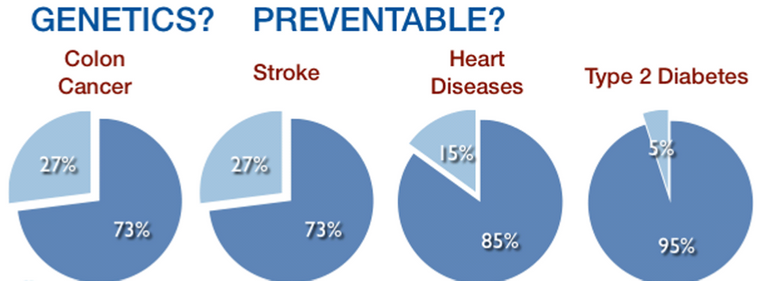Before anythings else, let's define what is degenerative deseases.
.jpeg)
Degenerative disease is the result of a continuous process based on degenerative cell changes, affecting tissues or organs, which will increasingly deteriorate over time, whether due to normal bodily wear or lifestyle choices such as exercise or eating habits.
According to American Journal of Medicine (2009). Illness and medical bills to a large and increasing share of US bankruptcy.
And to their study the world's leading cause of premature deaths are degenerative health conditions:
- Cardiovascular desease - 17 million death toll
- Cancer - 8.6 million death toll
- Stroke - 5.5 million death toll
- Respiratory disease - 3.7 million death toll
- Diabetes - 990,000 death toll
They say its all about genetics, but according to the same study conducted. Genetic is not the main factor.

The real culprit is oxidation or the free radical damage brought by the lifestyle of the majority of the people nowadays.
- Stress
.jpeg)
Stress is your body’s way of responding to any kind of demand or threat. When you sense danger—whether it’s real or imagined—the body's defenses kick into high gear in a rapid, automatic process known as the “fight-or-flight” reaction or the "stress response".
The stress response is the body’s way of protecting you. When working properly, it helps you stay focused, energetic, and alert. In emergency situations, stress can save your life—giving you extra strength to defend yourself, for example, or spurring you to slam on the brakes to avoid an accident.
Stress can also help you rise to meet challenges. It’s what keeps you on your toes during a presentation at work, sharpens your concentration when you’re attempting the game-winning free throw, or drives you to study for an exam when you'd rather be watching TV. But beyond a certain point, stress stops being helpful and starts causing major damage to your health, your mood, your productivity, your relationships, and your quality of life.
Your nervous system isn’t very good at distinguishing between emotional and physical threats. If you’re super stressed over an argument with a friend, a work deadline, or a mountain of bills, your body can react just as strongly as if you’re facing a true life-or-death situation. And the more your emergency stress system is activated, the easier it becomes to trigger and the harder it becomes to shut off.
- POLLUTION
.jpeg)
Pollution is the introduction of contaminants into the natural environment that cause adverse change. Pollution can take the form of chemical substances or energy, such as noise, heat or light. Pollutants, the components of pollution, can be either foreign substances/energies or naturally occurring contaminants.
Air pollution comes from both natural and human-made (anthropogenic) sources. However, globally human-made pollutants from combustion, construction, mining, agriculture and warfare are increasingly significant in the air pollution equation.
Motor vehicle emissions are one of the leading causes of air pollution.China, United States, Russia, India, Mexico, and Japan are the world leaders in air pollution emissions. Principal stationary pollution sources include chemical plants, coal-fired power plants, oil refineries, petrochemical plants, nuclear waste disposal activity, incinerators, large livestock farms (dairy cows, pigs, poultry, etc.), PVC factories, metals production factories, plastics factories, and other heavy industry. Agricultural air pollution comes from contemporary practices which include clear felling and burning of natural vegetation as well as spraying of pesticides and herbicides
- GMO Foods
.jpeg)
Genetically modified organisms (GMOs) are plants, animals, or organisms whose DNA has been artificially manipulated to modify their characteristics.
Through genetic engineering, scientists can handpick and extract specific genes from organisms, bacteria, and viruses and inject them into other organisms.
This process creates new species with an “improved” set of traits and a genetic code not found in nature.
GMOs are all around us. Many clothes, paper products, laundry detergents, and even cosmetics on the market today rely on genetically modified agricultural products.
There have been several studies linking genetically modified foods to undesirable consequences on health.
Many GMOs contain genes that make them resistant to antibiotics. Introducing these foods into the food supply means a dramatic decrease in the effectiveness of antibiotics.
While I don’t personally recommend the use of antibiotics, much of the population still depends on them to treat infection and disease.
Antibiotic resistance caused by GMOs could quickly spiral into an enormous threat to public health.
Multiple animal studies have also raised concerns about the role that GMOs could play in the disruption of the digestive system while other studies have even found toxins present in GMOs circulating through the bloodstream.
- POOR DIET

Poor eating habits include under- or over-eating, not having enough of the healthy foods we need each day, or consuming too many types of food and drink, which are low in fibre or high in fat, salt and/or sugar.
Being healthy is also about what you eat - choosing the right food. It is important to enjoy the food you eat - and eating in a healthier way may even be cheaper!
There is a direct relationship between your level of physical activity and how much energy you use up from the food you eat. If you eat more than you use the surplus energy is stored as body fat; this means you will become overweight which in itself increases your risk of disease and disability.
The risks to you: Coronary Heart Disease, high blood pressure, non-insulin dependent diabetes, constipation, joint pain, being out of breath. Your risks multiply if you eat too much animal fat, smoke, drink alcohol and take very little exercise
The risks to your family: Coronary Heart Disease, development of bad eating habits, poor life expectancy But leading a Healthy Lifestyle isn't only about being the right weight for your height.
Understanding the ingredients that make up your diet.
- FAST FOOD
.jpeg)
Fast food is a mass-produced food that is prepared and served very quickly. The food is typically less nutritionally valuable compared to other foods and dishes.
Fast food is a mass-produced food that is prepared and served very quickly. The food is typically less nutritionally valuable compared to other foods and dishes. While any meal with low preparation time can be considered fast food, typically the term refers to food sold in a restaurant or store with frozen, preheated or precooked ingredients, and served to the customer in a packaged form for take-out/take-away.
Fast food restaurants are traditionally distinguished by their ability to serve food via a drive-through. Outlets may be stands or kiosks, which may provide no shelter or seating, or fast food restaurants (also known as quick service restaurants). Franchise operations that are part of restaurant chains have standardized foodstuffs shipped to each restaurant from central locations
- PESTICIDES
.jpeg)
Pesticides are substances that are meant to control pests (including weeds).[1] The term pesticide includes all of the following: herbicide, insecticides (which may include insect growth regulators, termiticides, etc.) nematicide, molluscicide, piscicide, avicide, rodenticide, bactericide, insect repellent, animal repellent, antimicrobial, fungicide, disinfectant (antimicrobial), and sanitizer.
Health effects of pesticides may be acute or delayed in those who are exposed. A 2007 systematic review found that "most studies on non-Hodgkin lymphoma and leukemia showed positive associations with pesticide exposure" and thus concluded that cosmetic use of pesticides should be decreased. Strong evidence also exists for other negative outcomes from pesticide exposure including neurological problems, birth defects, fetal death, and neurodevelopmental disorder.
What Should We Do To Avoid Degenerative Desease?
Best way is to eat the right food, do routine exercise and take supplementation.
Hope this might be helpful to you. :)
.jpeg)
Wow! Very informative article.
Wow. thank for this sir! This is really important to us.
Thank you sir @fojrance. Let us all educate people about health.